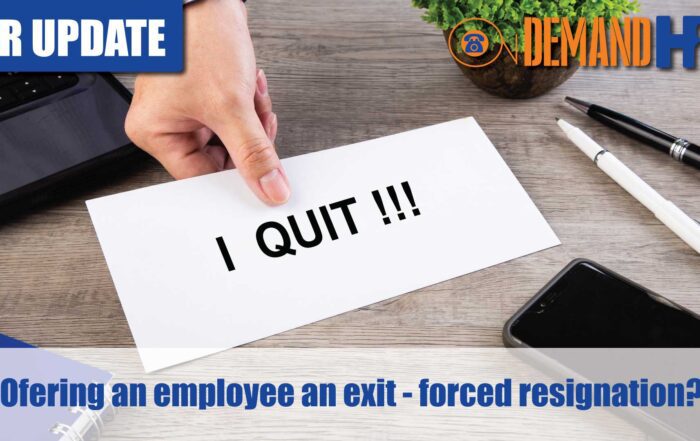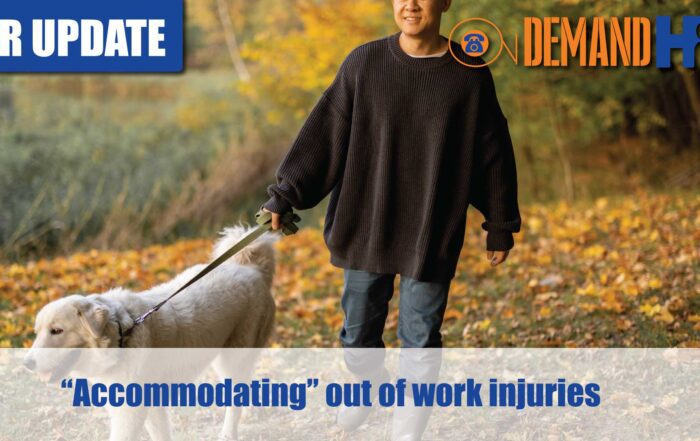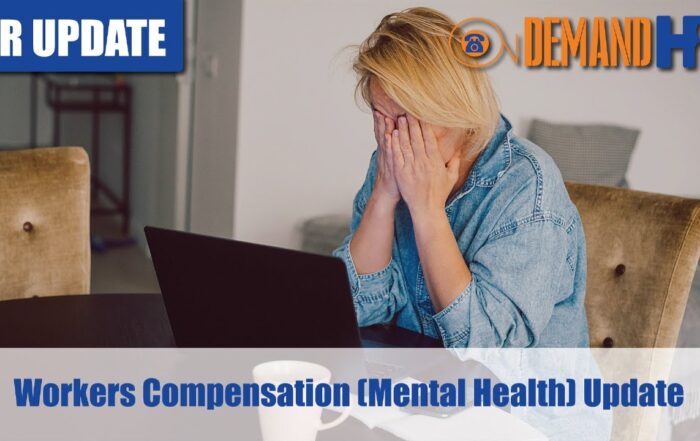How To Effectively Manage Sick / Personal Leave
In Episode 6 of HR Fridays where Clint talks about sick / personal leave, strategies to reduce absenteeism, when you might reject a medical certificate and how to have a good notification of absense policy.
Please see below for a full transcript of the video
Share the HR or workplace relations challenge facing your business and one of our experienced consultants will be in touch within 24 hours with a strategic action plan or discover the best strategy yourself by accessing out free online training library.
Transcript
Clint Indrele 0:19
Morning everyone, once again with On Demand HR. My name is Clint Indrele, Managing Director of On Demand HR. And we are here for another edition of HR Fridays. Today is episode six. So basically another week of talking through some key Workplace Relations and HR topics that affect businesses on a day to day basis. Every Friday 1130 we’re here we’ll have a specific topic each week, let us know of any topics of interest or future topics you would like us to talk about, please put in some comments, please interact with us. And we’re trying to provide advice to all businesses, which is based on reality. We’ve been in the Fair Work Commission many times we’ve dealt with the Fair Work Ombudsman many times. This allows us to provide real perspective on issues, not just theory and scare tactics that you will hear from from others. So our website www.ondemandhr.com.au.
Clint Indrele 1:19
Today’s edition is going to be on personal leave and sick leave, we’re going to talk through some of the considerations around this. And some of the key principles, some of the challenges around JobKeeper and COVID. And then we’re going to talk about some strategies towards the end of today’s discussion. So we’ll start with some key principles.
Clint Indrele 1:38
So first and foremost, personal leave is 10 days per year under the NES. And generally that’s mirrored in the modern awards that you’ll see or 122 modern awards, or however, however many it is that we have, obviously, in our system, national system of industrial relations. It can be used for personal illness or caring for an immediate member of your family or household. So those are the two ways in which personal leave can be used.
Clint Indrele 2:05
An important point is that accruals are progressive. So there’s still a number of businesses that think that accruals are based on anniversary dates, that system of accrual went out with the horse and cart. So that has not been the case for the best part of 10 years now. Accruals are progressive. And essentially, you should be accruing personal leave almost exactly the same way as your accruing annual leave either week to week on your on your payroll, or obviously on a month to month basis, or something similar but should be done on a regular basis.
Clint Indrele 2:38
The one question I actually get from clients a lot is do I need to put personal leave balances on payslips. And we always advise them not to do that you don’t want to be advertising that people have personal leave necessarily or sick leave to take in that particular manner. There is a requirement to provide obviously to maintain a balance and to provide employees with an account of their annual leave balance from time to time. So those are the typical considerations around those things.
Clint Indrele 3:04
Personal leavealso typically accumulates during paid leave. So for persons on annual leave on personal leave, or on long service leave, they continue to accrue personal leave during those particular periods as well.
Clint Indrele 3:16
And a final point on just one of the key principles to begin with is that evidence can actually be requested for all absences. This is something that employers get wrong on a regular basis, they say, Oh, well, I can’t request this interview, because it hasn’t been two days, or I can’t request a certificate because it’s not, you know, a Monday or a Friday or whatever it may be. What I would say to you is that you can request evidence for all absences provided that your policy and your contractual arrangements are enabling you to do that. So if you start creating obligations, which are less than the NES, then you may be required to follow those obligations. For example, if you only require a certificate after two days or more, then that would be the standard that you would follow. But what I would recommend to all clients is you always have the flexibility to revert back to requesting a certificate for any absence. And at least as a fallback option. You may have something in your contractual arrangements, like if you really want to make it two days or more, that’s fine. But then with a kind of a an additional clause, which says that can be requested at any other time that the company sees fit or something along those lines. So that is certainly something that’s important for that for businesses to know because a lot of businesses get it wrong when it comes to this particular point.
Clint Indrele 4:32
I got a question actually from Ritu, thanks very much for firing your question. What if employees call to ask their personal leave balance? Do we have to advise? Yeah, look really good question actually Ritu. And look, I think there’s an obligation to keep balances. I think there’s an obligation to obviously keep annual leave balances and provide them on a regular basis and to maintain sick leave balances. I think the question I’d be asking in response to that and the best way to deal with a request for personal leave balances is to ask why that that request is being made. So I don’t think I would just give give a number to the person out of hand and say, Well, yeah, this is your personal leave balance. And then surprise, surprise, a medical certificate comes in the following week. What I would do instead is actually be asking the employee, what is the reason that you’re asking for this particular balance to be provided? and asking them to justify that. And if I’ve got a justifiable basis, and obviously, I provide them with the information? And but yeah, look, there is certainly, from what we can see, there seems to be a different obligation on, you know, providing annual leave balances versus providing personal leave balances, we generally generally recommend not putting personal leave balances on payslips, as we mentioned earlier. But in terms of requests for balances, or how much do I have left? Ultimately, I think the best way to answer that question is with another question, because again, it goes to well, what is the motivation around that? And again, it also goes to well, if we believe that there is a premeditation, to taking personal leave, that could be a basis for us to challenge personal leave that’s taken.
Clint Indrele 6:08
And we’ll get into actually, on the next slide a little bit about situations where a medical certificate can be challenged, and when you might actually, you know, not necessarily accept the doctor’s word as gospel, so to speak. So we’ll talk about that a little bit more. And thanks very much for your question Ritu. I appreciate I haven’t answered it directly. But it’s a it’s certainly a difficult question to answer that one, I think the best way to attack that is to certainly put that back to an employee for a response.
Clint Indrele 6:39
In terms of COVID and JobKeeper. I think that that certainly three considerations on that, first of all, there is this kind of strange situation of what I would call a false entitlement. So we’ve got a situation where if a person’s personal leave balance runs out, ordinarily they go on to unpaid leave in normal circumstances. When we’ve got this JobKeeper environment, what we actually have a situation where personal leave balance runs out. And then a person continues to get paid on the basis of JobKeeper. So it’s almost as though it’s created this false extra entitlement, because JobKeeper underpins the employment of everyone provided, of course, that they’re nominated, and they’re eligible, and so on, and so forth. And obviously, the risk with that is, of course, that medical certificates are easy to get.
Clint Indrele 7:23
And we’re also seeing this extend to other reasons, such as I need to self isolate, I’m living with an at risk person. And there is this kind of we are seeing over the past few months, this kind of gilding the lily, when it comes to you know, absences and the reasons for these absences.
Clint Indrele 7:39
Just on self isolation, I think that you can certainly ask for evidence of the reasons for why a person is requesting to self isolate. And the second thing you can do is if they live with an at risk person where they are saying that’s the basis for them not coming to work. I think that’s that’s that’s a notion that really can be challenged now, because, you know, with minimal cases across Australia, with minimal cases, in particular in New South Wales, if a person saying I’m not coming to work, so I purely live with an old person or a sick person, I think that the the response to that should simply be well, we provide a safe working environment, the sanitization the workplace is regularly clean was so socially distancing those sorts of things, and almost eliminating the basis or the opposition of that person coming to work for for the reasons that they live with an at risk person of some kind. The other thing you could also do with that situation is challenge the employee to provide detailed reasons around why the person they live with is at risk on top of all those other work health and safety considerations. So that is a strategy of dealing with that particular objection.
Clint Indrele 8:45
Might just move on to the next slide, in relation to key strategy. So I think that these five things are probably key things that employers can do to deal with absences and to deal with general taking of personal leave, particularly if they feel that the system or the the entitlement is being abused. So the first thing I would suggest is that to request evidence for each day of absence. If you’re in a workplace where you’ve got individuals who, you know, don’t have great absence or attendance record, so to speak, and request evidence for each absence, Sure you can have an employment contract, which says it’s mandatory for two days or more and or at any other time that’s requested. And then, you know, you might decide for some individuals to exercise that right to request that medical certificate as it as it’s needed.
Clint Indrele 9:37
The second thing I would do is create a policy around notification requirements. So in particular telephone contact. One thing that’s a great way of stopping people from taking days off is requiring them to make telephone contact. If you say to them, we’re not going to accept text messages, emails or social media messages. It’s very easy to roll over in the morning in bed and send a text saying I’m not coming In the work, I’m sending something on Facebook or, or whatnot. But it creates an initial obligation and a deterrent to create a telephone contact requirement. So that’s certainly a suggestion we would have for your policy and contact prior to start time is another one. So making sure that any contact requirement is prior to the start time, and to take disciplinary action if the policy isn’t followed. So whilst there are provisions in the Fair Work Act, which prevent or prevent employers from taking adverse action against employees for exercising workplace rights, our view is that it is legitimate and reasonable to take actions when employees have not followed the proper notification requirements that are that are established by the company, sure that person has a right to sick leave, or personal leave, but they don’t have the right to simply ignore the policy altogether, and to be absolved from any potential consequences of that. So that’s the way we often suggest in dealing with those issues.
Clint Indrele 10:57
In terms of the temporary absence provisions. This is another one another trick up the sleeve, if you like that we do sort of talk about with clients from time to time, if we have an employee that’s approaching a very lengthy period of absence, we say to them, Look, please understand if you do extend beyond three months, that the employer or the employer may consider termination of employment, as you’re no longer protected from termination, or due to temporary absence. So there’s provisions of the Fair Work Act, which essentially say that if you’ve got a period of absence of three months, and it’s not all paid leave, essentially, then the employer has the ability to consider the ongoing employment. So that is certainly something that can be thought about.
Clint Indrele 11:39
I’m just going to finish with a couple of minutes on rejecting medical certificates. So your medical certificates should be accepted most of the time, but are not necessarily gospel, and that’s probably the hardest thing to accept. Sometimes I think most employers think, well, I’ve got a medical certificate, I have to accept it. It’s not actually, you know, without actually thinking about the circumstances. And I’ve had a couple of situations in the past where, where this has actually played out, we had one employee who produced a medical certificate, saying that she was off for three or four days, but then on social media was seen going on holidays, you know, way out of way out of town, and the employer correctly and rightly formed the view that well, this sick leave or personal leave wasn’t legitimate, that, you know, the obviously the information that she’s presented to a doctor, which she’s then which has then been formalized in the way of a medical certificate was not true and correct. And that we had sufficient information to disregard that medical certificate for the purposes of whether or not she should be entitled to personal leave. At the end of the day, we need to remember that a doctor is often Yes, sure, they’re making a diagnosis on an observation. But it’s also based on obviously what what they are being told by an employee as well.
Clint Indrele 12:51
The second thing, the second scenario we had was at one years ago with another client, where they had a situation where they had an employee, again, who provided a medical certificate, said that he basically couldn’t come to work because he had to, he was he was unwell on these sorts of things. And there was, again, social media evidence that he’d been basically out of, you know, out of a nightclub till four o’clock in the morning, the previous day before he was required to come to work. So again, we formed the view that that wasn’t a legitimate absence. And that, essentially, the employee, the reasons that were given on the medical certificate were not valid. And on that basis, it was, it was rejected. So that is, that was another scenario. And there’s been many, many scenarios over the years where you’ve actually encouraged an employer to reject a medical certificate. Another one we see quite often is whether an employee provides a medical certificate during the notice period. So trying to avoid giving their employer notice, by way of satisfying that with a medical certificate, that can be a challenging one, it just depends on the circumstances. And, you know, I guess what we’ve got to look at is whether there’s an intention to work the notice period or not, and whether there was a premeditation, for that employee to end their employment on that particular date. So that’s one we see that’s, you know, comes up from time to time on a regular basis. So, that’s a little bit about rejecting a medical certificate. So I guess the, the tale out of that, or the lesson out of that is to, sure medical certificates should be accepted most of the time, but don’t think that a medical certificate trumps everything, including anything compelling that you might have, that suggests that the absence is not legitimate. So at the end of the day, a doctor doesn’t know if a person has been out of the nightclub at four o’clock the night before. They don’t know if they’ve been on holidays instead of actually, you know, unfit for work. So, you know, whilst a doctor knows a lot of things, they don’t necessarily know the full set of circumstances around an employee’s absence and they can only comment on what they’ve observed ultimately.
Clint Indrele 14:51
So that’s pretty much the end of today’s presentation. So look, if you’ve got any final questions, feel free to shoot them through in the next 30 seconds, but ultimately, look We try to provide this advice to clients every week just to keep in touch. Try to provide value to new businesses that we don’t deal with. If you want any further information about our services, www.onndemandhr.com.au we’ve got a whole host of videos actually from all of our Facebook Lives on that on our website for you to see. And yeah look forward to speaking to you again in the future. From Clint Indrele Managing Director of On Demand HR. It’s it’s goodbye for now.






